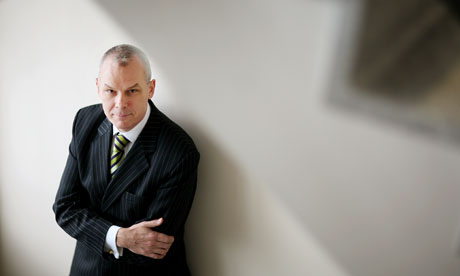 |
| Ben Summerskill: 'Thousands of gay people are growing older without the same family and support structures that many straight people enjoy.' Photograph: Graeme Robertson for the Guardian |
The report, the first of its kind, has implications for GPs, health and social services at a time when Britain's population is ageing. It is estimated that there are a million lesbian, gay and bisexual people in Britain over the age of 55.
A YouGov survey, commissioned by the campaign group Stonewall, found that older gay and bisexual men are three times more likely to be single than heterosexual men.
Just over a quarter of gay and bisexual men and half of lesbian and bisexual women have children compared with almost nine in every 10 heterosexual men and women. They were also less likely to see biological family members regularly. Less than a quarter of LGB people see their biological family members at least once a week, compared with more than half of heterosexual people according to the survey of 1,050 heterosexual and 1,036 LGB people over the age of 55.
"This pioneering research confirms what we already knew intuitively, that there are hundreds of thousands of lesbian and gay people growing older without the same family and support structures that many straight people enjoy," said Ben Summerskill, chief executive of Stonewall. "Quite often, that's because their own families have disowned them just because of the way they were born."
The prospect of impending loneliness is a recurring theme among those interviewed for the report. "As a single gay man, I feel sad about my prospects of finding emotional comfort and support," Michael, 60, told interviewers.
Paul, 59, said: "My gayness makes me less connected to my biological family who would otherwise look out for me."
The prospects of a solitary old age may be one explanation for why the survey suggests LGB people are consistently more anxious about growing older than heterosexual people.
With diminished support networks compared to their heterosexual peers, they are more likely to rely on formal support services as they get older. Stonewall's report found they were nearly twice as likely to rely on external services such as GPs and social services as heterosexual people. But many worried that the services would not meet their needs. Three in five are not confident that support services will meet their needs.
Some 72% of LGB people said they were worried about the prospect of needing care later in life, compared with 62% of heterosexual people. Half said they were worried about housing compared with 39% of heterosexual people while 69% were worried about their health compared with 59% of heterosexual people.
Frank, 64, said: "I worry about my partner becoming ill or dying, and about leaving him alone if I die first." James, 55, said: "Being gay and getting older is like not being gay and getting older but difficulties are magnified."
Their fears are compounded by their lifestyles. Gay people are far more likely to drink alcohol regularly, take drugs and have a history of mental health problems than heterosexual people.
But despite these concerns many would feel uncomfortable about revealing their sexuality to those who work in the public health and support sector. Nearly half said they would be uncomfortable about coming out to care home staff and a third would be uncomfortable coming out to a housing provider or a paid carer.
"For the first time this generation of ageing gay people fully expects to be treated with respect by both public and commercial service providers," Summerskill said. "They want to be able to share a room in an old people's home or to be supported through their partner's terminal illness just like anyone else."
Summerskill expressed concern that Britain's care system failed to recognise that not all couples were the same. "We're facing a care time bomb of institutional ignorance about what a community that makes a £40bn a year contribution to public services will soon – quite properly – be demanding."
AGEING DIFFERENCES
■ 40% of gay and bisexual men over 55 are single, compared with 15% of heterosexual men.■ 41% of lesbian, gay and bisexual people over 55 live alone compared with 28% of heterosexual people.
■ 8% of lesbian, gay and bisexual people over 55 see members of their family a few times a week compared with 21% of heterosexual people.
■ 15% of lesbian, gay and bisexual people over 70 work compared with 6% of heterosexual people.
■ 9% of lesbian, gay and bisexual people over 55 have taken drugs within the last year, compared with 2% of heterosexual people.









